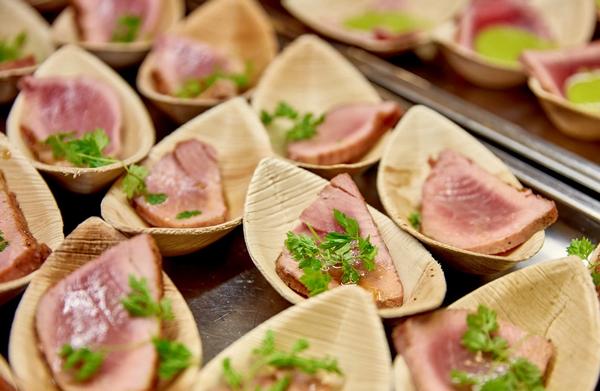Fellowship, pride and opportunities
“In Norwegian society, there are far too many people who fall outside working life, who are not allowed to be part of the community”, says Tone Hartviksen enthusiastically. At the beginning of 2020, she was hired as head of social sustainability in 4Service, a completely new position in the company.
Sustainability is an integral part of how 4Service works, in everything from food and energy saving to waste and recruitment. In 2019, the company decided to increase its efforts related to social sustainability and thus contribute to small differences in society.
“As an employer, we must make sure to consider each individual. It is often not about ability or intent, but about a lack of opportunities and adaptation. The work on social sustainability is about just this, seeing and creating opportunities. This applies to both those who are here today, and those who may become part of our community in the future.”
After a long career in the work and inclusion sector, Hartviksen knows what she's talking about.
“There is a clear distinction between the public sector and those who have the direct ability to create change. 4Service is a representative of the latter. The Norwegian welfare model is dependent on high labour force participation. As a company, we have the power, the economy and the jobs to make a real difference.”

Companies that choose to recruit through alternative channels are happy to do it again. Hartviksen is clear about why.
“Inclusion is profitable and has a positive effect on the bottom line. There is plenty of evidence, and we benefit in the form of a stronger culture, loyalty, lower levels of absence due to illness and increased ability to cooperate.”
12 March
Social sustainability is not just about inclusive recruitment and cooperation with the public sector. It's just as much about your own organization. In a year of pandemic, it has almost become additionally important.
“I was laid off only ten days after I started the job, like so many others in the company and in our industry. But even after such a short period of service, I felt really well taken care of and included.”
Her tone becomes thoughtful as she reflects on the lay-off period from March to September.
“That experience made me even more aware of the importance of social sustainability internally. Giving employees good opportunities for individual competence development is a good example of a measure that can provide great benefits for everyone.”
The head of social sustainability in 4Service has a clear recommendation for other actors who want to contribute to more community:
“It's easy to talk about strategies, values and plans for sustainability, but nothing has value before it is put into action. Commitment and opportunities must be realised and tested. Only then is one in the process of creating lasting change.”
Food enjoyment
In parallel with the focus on people, there is a strong commitment to good and sustainable food in 4Service. Here, too, the company has brought in external expertise, among other things through a close and long-term collaboration with Andreas Viestad.
“I have been so lucky to work with most things in food, including training children, running restaurants, writing cookbooks, food journalism and collaboration with various business actors”, says Viestad.
Saying that Andreas Viestad is obsessed with food is an understatement, at best. With a background in the media and TV, his path to the top of the Norwegian food industry has gone from theoretical to practical. He has a lot on his mind, especially in the field of sustainability. This is an area that is not as difficult as many people would like it to be.
“Sustainability in the food industry is first and foremost about applying a little critical thinking. Once you have answered a few simple questions, it's all about creating systems and presenting solutions that people are actually able to relate to. It's no worse than that!”
Viestad's challenge to the business community is simple and powerful: Add something, don’t just talk about it.
Collaboration with 4Service
It was this practical attitude to sustainability that brought Viestad and 4Service together. Since then, the menus have evolved a lot. Norwegian fish, seasonal ingredients, colourful salads, less food waste and lots of food enjoyment are essential keywords.

“Unfortunately, far too much sustainability only exists in boardrooms and strategies. There are a lot of big words and many promises. Fortunately, the collaboration with 4Service is the exact opposite! From the company's management to the chefs in the operation, everyone contributes to seeing opportunities every time we get the chance to meet.”
Even as an external partner, Viestad highlights the unique unity in the company.
“It’s easy to see that the culture is strong. It is especially evident in the various chefs I have been allowed to share knowledge with. They have a genuine pride in their profession and what they put on the table every day.”
Home is good, but away is best?
Everyone who works with catering knows that the most important thing is to understand your guests. This is also the case for the chefs in 4Service.
“For one reason or another, a misconception has taken root in society that in order to solve problems, the solution is just a matter of removing things.”
Viestad talks about how many experts propose to introduce meat-free days in response to over-consumption of certain food categories.
“Ordinary people like you and me have never cheered for others to take away what we love. The solution is to reduce, adjust, think smarter and see opportunities!”
A slightly different dinner dish with lasagne is a good demonstration that Viestad and 4Service can find their own ways to achieve the goal.
“A while back, one of the chefs shared a nice story. We had brought out a lasagne with beef that had been cooked for a long time, for 36 hours. With a few simple steps, we thus reduced meat consumption by 30%, while at the same time we used even more of the animal. We did all this without sacrificing any of the great flavour that people expect and deserve.”
The dish might not have survived on the menu if the guests did not like the new version. But the result of the initiative was that workers, who had been away from camp for a few weeks, returned to work and told us that they had missed the lasagne while they were at home.”
Viestad laughs and sums it up rhetorically:
“There is no better example of practical sustainability in food.”